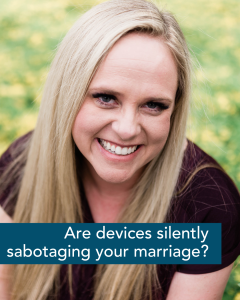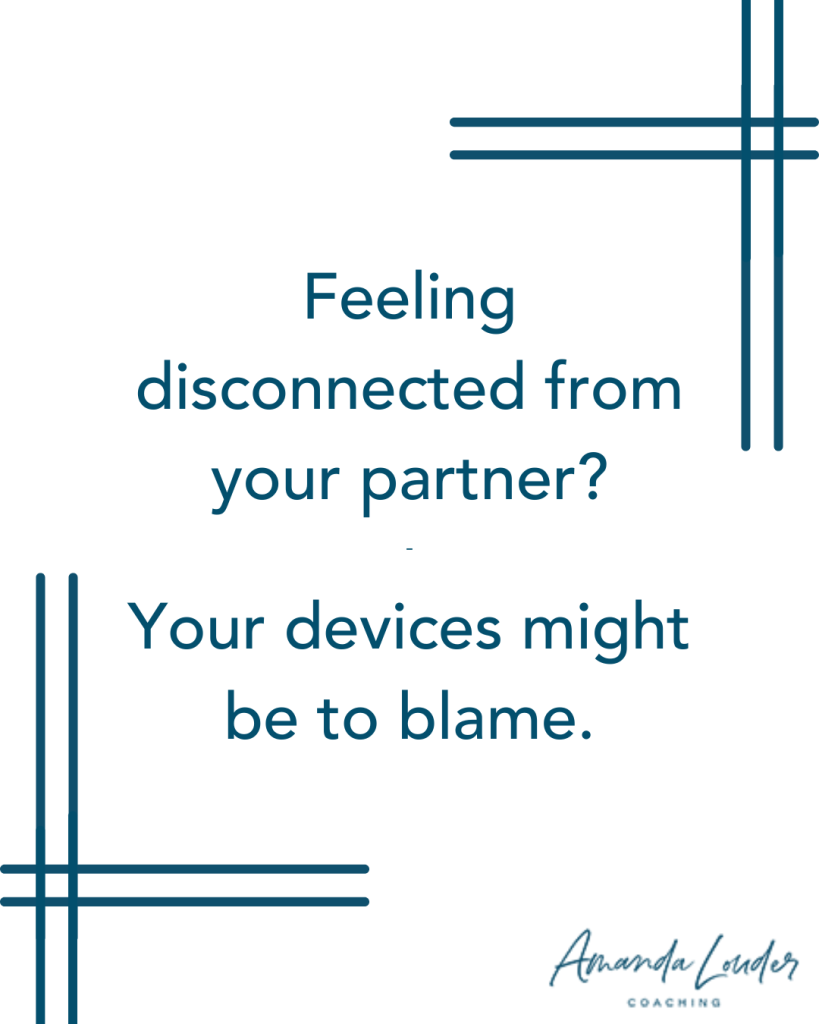
In this episode, I want to talk about something that is more and more relevant in our digital age – how devices are hurting marriages and sexual relationships. Because this is now the third leading cause of divorce in the United states, it seems like it’s something that needs to be discussed. So, let’s discuss why devices can be so bad for our relationships, and what we can do about it.



Show Notes:
Follow Amanda on Facebook and Instagram.
Join Amanda’s Private Facebook Group.
Show Summary:
Today, we’re going to talk about a topic that’s become increasingly relevant in our digital age: how devices are hurting marriage and sexual relationships.
Devices: The Third Leading Cause of Divorce
Recent research indicates that devices are now the third leading cause of divorce in the United States. This is a staggering statistic, highlighting just how pervasive the issue has become. But why are devices having such a detrimental impact on our relationships?
Why Are Devices Hurting Our Relationships?
First, let’s consider why we turn to devices in the first place. Devices offer an escape. They provide endless entertainment, social connection, and even a sense of accomplishment through games and social media interactions. However, this escape comes at a cost. When we prioritize our screens over our partners, we sacrifice meaningful, real-life connections, particularly with our spouses.
Engaging with Devices Rather Than Our Spouses
One of the most significant issues is the time spent on our phones or tablets instead of with our partners. It’s easy to get lost in the latest social media feed, news update, or game, but this often means we’re neglecting the person sitting right next to us. Picture this: you come home from work, and instead of having a meaningful conversation with your spouse about your day, you both sit in silence, absorbed in your respective devices. Over time, this lack of communication can lead to feelings of isolation and resentment.
For example, I remember one couple sharing how they would spend their evenings sitting next to each other but engaged in their phones, barely speaking a word. They felt distant and disconnected, even though they were physically close. This is a common scenario that many couples face today.
Reaching Out to Old Friends or Acquaintances
Another problematic behavior is reconnecting with old friends or acquaintances through social media. While reconnecting itself isn’t inherently bad, it can sometimes lead to emotional or even physical infidelity. What starts as a harmless chat can quickly become a secretive and intimate exchange, pulling emotional resources away from your marriage.
Take the story of John and Lisa, for example. John reconnected with an old high school friend on Facebook. What began as casual catching up slowly turned into more frequent and intimate conversations. Lisa felt betrayed and hurt when she discovered these exchanges, as John was sharing personal details with someone else instead of with her.
Turning to Porn or Games
Turning to pornography or games is another major issue. These can become unhealthy distractions that take away from the intimacy and connection with your spouse. Pornography can create unrealistic expectations about sex and reduce satisfaction with your real-life sexual relationship. Gaming, on the other hand, can consume hours of time and attention, making it difficult to engage meaningfully with your partner.
For instance, Sarah noticed her husband, Mark, was spending hours playing online games every evening. Their conversations dwindled, and their sex life suffered. Mark’s gaming became a barrier to their intimacy, leading Sarah to feel neglected and frustrated.
Why Do We Turn to Devices Instead of Our Spouse?
So, why do we turn to devices instead of our spouses? Sometimes, it’s simply easier. Devices don’t demand emotional effort or vulnerability. They provide quick, easy gratification. But this ease comes at a significant cost. By avoiding the harder work of engaging with our spouse, we’re undermining the foundation of our relationship.
Does It Help Us Avoid Intimacy?
Turning to devices can also help us avoid intimacy. Real intimacy requires effort, vulnerability, and sometimes uncomfortable conversations. It’s not always easy, but it’s crucial for a healthy, fulfilling relationship. Devices can act as a shield, protecting us from the effort and vulnerability required for true intimacy.
Specific Problems and Their Impact
To paint a clearer picture, let’s look the possible impact of each of these issues:
- Engaging with Phones Rather Than Spouses: This can lead to feelings of neglect and loneliness. Your partner might feel like they’re competing with your phone for attention, which can diminish their sense of importance in your life.
For example, Tom often felt ignored when his wife, Maria, would spend their evenings scrolling through social media. His attempts to start conversations were met with distracted nods and half-hearted responses, making him feel unimportant and unseen.
- Reaching Out to Old Friends or Acquaintances: This can create emotional infidelity. Sharing intimate details with someone else can make your spouse feel betrayed and erode the trust in your relationship.
Consider Emily, who discovered that her husband was confiding in an old college friend about their marital issues instead of talking to her. This revelation deeply hurt Emily and created a significant rift in their trust.
- Turning to Porn or Games: This can lead to unrealistic expectations and a lack of real-life engagement. It can diminish your sexual satisfaction and reduce the quality time you spend with your partner.
Jake’s use of online porn created unrealistic expectations for his sexual relationship with his wife, Laura. She felt pressured to meet these unrealistic standards, which damaged their intimacy and led to feelings of inadequacy.
What Can We Do to Change Our Behavior?
So, what can we do to change our behavior? It starts with awareness and intentionality. Here are some steps you can take:
- Set Boundaries: Establish clear boundaries for device usage. For example, no phones at the dinner table or in the bedroom. Make specific times of the day device-free to encourage real interaction.
- Prioritize Quality Time: Make it a habit to spend quality time together without devices. Plan regular date nights or simply set aside time each evening to talk and connect.
- Communicate Openly: Discuss your concerns with your spouse. Talk about how device usage is affecting your relationship and work together to find solutions.
One couple I know decided to implement a “tech-free Tuesday” where they would put away all devices for the evening and focus on each other. This simple change significantly improved their communication and connection.
Talking to Your Spouse About Changing Their Behavior
If you’ve noticed that your spouse’s behavior with the device is hurting your marriage and sexual relationship, it’s important to talk to them about it. When approaching your spouse it’s important to be gentle and understanding. Avoid blame and instead focus on how you feel. Use “I” statements, such as “I feel lonely when we don’t spend time together” or “I miss our conversations.” Suggest working together to find a balance that works for both of you.
Reconnecting After Devices Have Been a Problem
Once you’ve talked about how you want things to change, sometimes reconnecting can be challenging, but it’s definitely possible. Here are some tips:
- Rebuild Trust: If there’s been emotional infidelity or secrecy, work on rebuilding trust. Be transparent and honest with each other.
- Increase Physical Intimacy: Make an effort to increase physical affection and intimacy. Small gestures like holding hands, hugging, or cuddling can help rebuild your connection.
- Seek Professional Help: If the issues are deeply ingrained or difficult to resolve on your own, consider seeking help.
Conclusion
Devices are a powerful tool, but they shouldn’t come at the expense of our most important relationships. By being mindful of our device usage and prioritizing our spouse, we can strengthen our marriages and improve our sexual relationships. Remember, the effort you put into your relationship will pay off in deeper intimacy and a stronger connection with your spouse.
Remember, love is a journey, not a destination. Stay committed, stay passionate, and stay connected. Goodbye for now.




